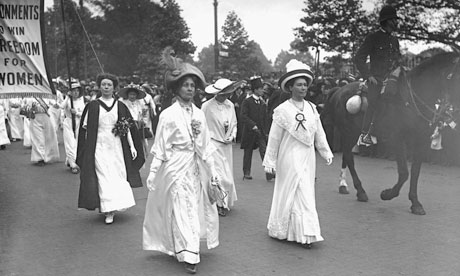"Why We Are Militant"- A Critique of the British Government
Emmeline Pankhurst’s speech, “Why We Are Militant,”
represents the unique approach to suffrage in England, based on the
participation of women from upper social classes, who Pankhurst herself
describes as “the fortunate women,” and the element of militancy (CP 208). Pankhurst
provides appropriately a strong and assertive defense of women’s use of force
in the fight for suffrage. Interestingly, Pankhurst employs the history of men’s
enfranchisement to support the argument for militant action for women’s suffrage.
For example, she stated in relation to working class men gaining the vote in
1884, “Rioting was threatened and feared, and so the agricultural labourers got
the vote…Men got the vote because they were and would be violent” (CP 207). In addition,
she emphasized that the militant aspect of women’s suffrage derived from a last
resort, in that the women “have tried all other available means and have failed
to secure justice” (CP 208). Both such components of her argument are
significant to the way in which she actually represents a general critique of
how the British government operates. For instance, Pankhurst stated, “Nothing
ever has been got out of the British Parliament without something very nearly
approaching a revolution,” and in a direct response to Parliamentary measures, “It’s
no use gentlemen trying to put us off with sentimental legislation” (CP 209). In
essence, she places the overall inefficiencies, negligence, and injustice of
the British government in a prominent spotlight within her account. She even
further attributes characteristics typically assigned to women in a patriarchal
sense, like “sentimental,” to the very actions of the British government.
Altogether, Pankhurst appears to defend the militant component of the suffrage
movement, not by justifying violence necessarily, but by highlighting the root
of the problem, in this case, the government, that necessitated the violence.
Do you think that Pankhurst's speech is convincing of the fact that the militant element was necessary?
 The Pankhursts – Christabel, Emmeline and Sylvia – lead a suffragette parade through London in 1911. Image source: http://www.theguardian.com/commentisfree/2012/aug/21/women-rights-march-on-parliament
The Pankhursts – Christabel, Emmeline and Sylvia – lead a suffragette parade through London in 1911. Image source: http://www.theguardian.com/commentisfree/2012/aug/21/women-rights-march-on-parliament

No comments:
Post a Comment